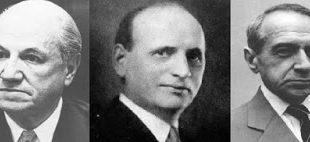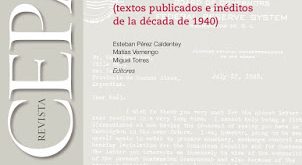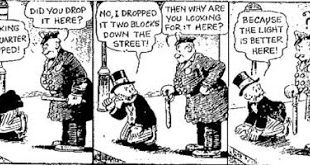[embedded content] Esteban Pérez's talk at the University of Chile, about Raúl Prebisch, about whom we have written several papers. This is in Spanish.
Read More »How Industrialization Become the Core of Raúl Prebisch’s Thought
New paper by Adriana Calcagno. From the abstract:This paper focuses on the intellectual path through which Raúl Prebisch placed industrialization at the center of his economic thought and policy recommendations. It shows how the changing international context of the 1930s and 1940s made him depart from laissez-faire and adopt counter-cyclical policies, gradually abandoning the agrarian export-led growth model and finally embracing industrialization as the new growth strategy for...
Read More »Is dependency over?
[embedded content]Short clip of part of an interview. I discussed that in an old paper here, and in another interview here.
Read More »Prebisch After ECLAC and UNCTAD
[embedded content]My talk at the Universidad Nacional de Colombia last Friday, in Spanish of course. Part of the argument is that Prebisch, contrary to what is often assumed, moved from an argument that emphasized the role of the external constraint in leading to underdevelopment during his United Nations years, to one that put the emphasis on the patterns of domestic consumption, and its negative impact on the surplus, following the literature on stagnation, in his last book on peripheral...
Read More »Prebisch’s Critique of Bretton Woods Plans
Prebisch, Williams and KaleckiNew Working Paper with Esteban Pérez at the networkideas. From the abstract:The name and work of Raúl Prebisch are often associated with the problem of long-term economic development in Latin America. Less well known and explored is Prebisch’s contribution to the study of the monetary and financial problems of the countries of the periphery in relation to those of the center. Prebisch analyzed the post-WW-II monetary plans of John Maynard Keynes and Harry Dexter...
Read More »Raúl Prebisch as a Central Banker and Money Doctor
Here we edited with Esteban Pérez and Miguel Torres some unpublished manuscripts from Prebisch related to the Federal Reserve missions, led by Robert Triffin, to the Dominican Republic and Paraguay, in which he emphasizes the need of capital controls in peripheral countries that did NOT have the key hegemonic currency. There is also a discussion of Keynes and White's plans for Bretton Woods, which were partially published before. In Spanish. Happy New Year!
Read More »Forty Years of Balance of Payments Constrained Growth and Thirlwall’s Law
From original draft by Thirlwall Thirlwall's seminal paper on the balance of payments (BOP) constrained growth is forty years old. Paul Davidson once referred to the BOP constrained growth as a positive Post Keynesian contribution to economics. The Review of Keynesian Economics (ROKE) will publish soon a special issue with many well-known contributors to the literature, and with a paper by Thirlwall himself.The idea built on the Kaldorian supermultiplier model (Kaldor mark II), and with...
Read More »Raúl Prebish’s Unpublished Manuscripts on the Buenos Aires Lectures on Economic Dynamics
By Esteban Pérez CaldenteyRaúl Prebish’s Unpublished Manuscripts on the Buenos Aires Lectures on Economic Dynamics edited by Esteban Pérez Caldentey (ECLAC) and Matías Vernengo (Bucknell University), have been published in the ECLAC Review, August 2018 Raúl Prebisch (1901–1986), the Second Executive Secretary of the Economic Commission for Latin America and the Caribbean (ECLAC) which he joined in 1949 is mostly known for his long-run analysis and diagnostic of the development problem of...
Read More »Heterodox Central Banking in the Periphery
Our paper with Esteban Pérez on Prebisch's missions as a Money Doctor during the Fed-led missions directed by Triffin to Paraguay and Dominican Republic has been publish in Research in the History of Economic Thought and Methodology. From the abstract: Traditionally, monetary policy in Latin America followed the recommendations of the missions of the monetary “doctors” who defended an independent central bank and a pro-cyclical monetary policy, adhering to the automatic adjustment of the...
Read More »Prebisch manuscripts for his classes on economic dynamics
There is a trend in the history of economic thought field to depend more on archival research. It is certainly nothing new, since some of the best research in the history of ideas, e.g. Sraffa's reconstruction of Ricardian theory, was essentially dependent on archives. The publication of Keynes collected papers have also sparked a wealth of interpretations about his theories, not all worth reading. I have done some research in Marriner Eccles archives at the University of Utah.In part,...
Read More » Heterodox
Heterodox






